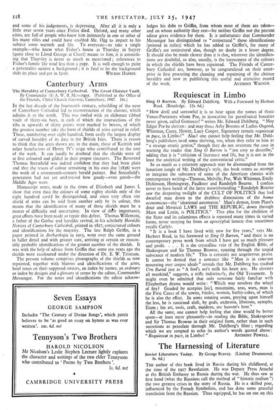Requiescat in Limbo
Sing ip Barren. By Edward Dahlberg. With a Foreword by Herbert Read. (Routledge. 12s. 6d.) " How droll and sorrowful it is to hear again the names of those Venus-Poetasters whom Poe, in invocation for paradisaical bounties never given, called Geniuses! " writes Mr. Edward Dahlberg. " May Edgar Poe be shriven : and may those Ashy Bosoms of Ladies Osgood, Whitman, Carey, Hewitt, Lucy Cooper, Sigourney remain requiescat in pace, in Limbo!" Alas! one cannot help. feeling that Mr. Dahl- berg's publishers need some shriving, too, when they refer to him as " a strange erratic genius," though they do not overstate the case in warning the reader that Sing 0 Barren is " not easy to describe," adding that it is " criticism of literature and life, but it is not in the least the analytical writing of the conventional critic."
In so much as a coherent approach may be disentangled from the luxuriant jungle of Mr. Dahlberg's style, the book seems an attempt to integrate the substance of some of the American classics with contemporary writing—Thoreau, Melville, Poe, Walt Whitman, Emily Dickinson, Hemingway, Faulkner and Randolph Bourne. I confess never to have heard of the latter notwithstanding " Randolph Bourne saw the deepening twilight of the CULT OF POLITICS that had dwarfed man down to the drabbest dimensions of the homo economicus—the ' ideational automaton.' Man's demon, from Plato's dour and Mosaical LAWS and THE REPUBLIC, down through Marx and Lenin, is POLITICS." This plea for the abolition of the State and its calamitous effects is repeated many times in varied forms, never straying far from an apocryphal lament that sometimes recalls Carlyle. " It is a book I have lived with now for five years," says Mr. Herbert Read, in his foreword to Sing 0 Barren, " and there is no contemporary prose work from which I have got so much pleasure and profit. . . . It is the crystalline vein of the English Bible, of Shakespeare and Sir Thomas Browne, running through the torpid substance of modern life." This is certainly not ungenerous praise. It cannot be denied that a sentence like "Man is in constant mourning over corpse ideals " reveals that Mr. Dahlberg has studied Urn Burial just as " A fool's ass's milk his heart jets. He elevates all mankind," suggests, a trifle indistinctly, the Old Testament. It might even be admitted that only someone fairly familiar with Elizabethan drama would write: " Which way revolves the wheel of fire? Goaded by scorpius [sic], mountains, seas, wars,_ man is the First Cause of the towns, battles, women, barley-cakes, of which he is also the effect. In some rotating aeons, preying upon himself the less, he is sustained aloft, by gods, ambrosia, libations, nymphs, Ilium ' - his art, tools, craft, maidens, are heaven's host." All the same, one cannot help feeling that time would be better spent—at least more pleasantly—in reading the Bible, Shakespeare and Sir Thomas Browne in their original form, rather than in such secretions as percolate through Mr. Dahlberg's filter ; regarding which we are tempted to echo its author's words quoted above:
" Requiescat in pace, in Limbo! " ANTHONY POWELL.


































 Previous page
Previous page